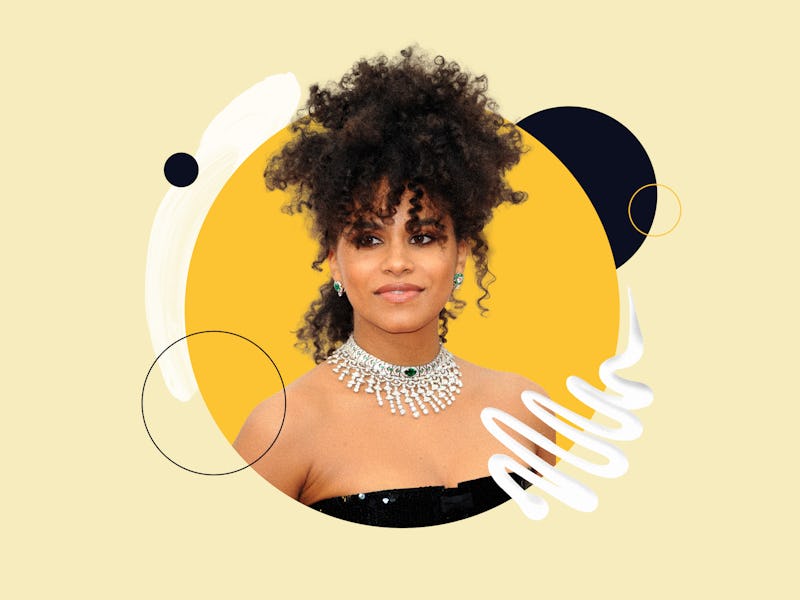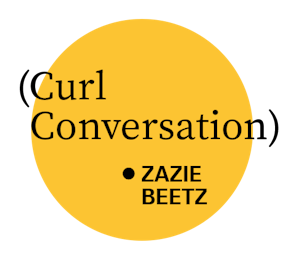(Curl Conversation)
Zazie Beetz On Her Natural Hair Journey, Hollywood, & Go-To Products
The Atlanta star shares how the natural hair movement has evolved during her time in Hollywood.

Future Publishing/Getty Images

Although dress codes — both in school and in places of work — don’t require straight hair, it is often implied, which makes it difficult for anyone that has curls and coils (types 3 and 4) to wear their hair in any style, without judgment or discrimination. And sure, there is legislation like the CROWN Act that is working to end race-based discrimination — but at the root of it, there is a level of scrutiny that comes with being Black in America. And for Zazie Beetz, although her hair was embraced in her German-American home, that wasn’t always the case when she stepped out the comfort of those doors. “I grew up in New York, in a diverse community where my hair texture was never questioned or emphasized as beautiful, normal, or natural,” says the actor. “And in this way, I was lucky to have a strong foundation when I went out into the world where most people didn’t understand my lived experience.”
For the German-born, New York raised, Emmy-nominated star known for the FX series Atlanta, and more recently as Mary in The Harder They Fall, her love and appreciation for her natural hair has always been a common thread in her life. “I like my hair out and however it is, and from a young age I understood that was enough,” the actor says.
TZR spoke with Beetz about her journey towards embracing her curls and her stance on advocating for natural hair. Plus, more on her efficient and to-the-point beauty routine.
What was your relationship with your hair like growing up?
When I was small, it was always my mom and my aunts doing my hair. I had it in all kinds of braids styles. But not ones with extensions that you would see today — long-term braid styles or some version of puffs and what not. I had these type of long-term styles through middle school.
When I would get tired of having them do my hair (I didn’t like getting my hair done), I’d insist on relaxers. Getting my hair done was painful and I was very aware of how my classmates saw my hair as different. People would ask me about the process of washing my hair and touch it without my consent.
So I often felt like I wanted to just have it straighter but my mom refused. My mom relaxed her hair when she was young but for her whole adult life she had locks and she was very big on me not doing relaxers. ‘It’s simply not healthy for your hair,’ she would say. Because relaxers and straight hair were not an option for me, I started gaining appreciation around my curls.
When I was entering high school, I began thinking it was time to learn how to deal with it myself. So my mom stopped doing my hair and I learned different techniques and wash-day essentials, which is also the moment I started wearing it out more. It’s one thing having your mom do your hair, versus you learning to really do your own thing and learn what you like.
I remember when I was 14, I hadn’t worn an afro in years and I decided to at school. I remember feeling so self-conscious about it, feeling as if people had boxed me in the braided style my mom had me in and wouldn’t be able to accept this new me. This was 2005, and the natural hair movement in the United States hadn’t really started yet and it was scary portraying a different look.
And so how did you deal with these looks, glares, and hair touching? Is this something you still work at?
I would feel very irritated by people constantly touching my hair. But weirdly, I also felt normal because it was happening all the time. But when I started really experimenting with my hair and trying to do different things, I got used to my hair being out and then I really started embracing it.
Towards the end of college, in 2013, the natural hair movement started really to pick up speed and Youtube took off. That really changed my world in terms of seeing more hair tutorials online. It was cool to see how the conversations in the street transitioned from people wanting to touch my hair to people asking when I did the big chop or coming up to me excitedly sharing they were also on a natural hair journey and inquiring what I do with my hair. That was a cool connective thing. And to see that around that time was very different to what I saw in Europe. It was interesting to see how much the US had shifted into this embrace of curl texture and kinky hair whereas in London, France, and Germany it hadn’t happened yet.
I also feel like there is so much more information out there around natural hair now, that it’s less common to become bewildered by it. At least, I hope that’s what’s happening.
You speak a lot about the natural hair movement. What exactly does it mean to you?
I say all those things with the belief that it’s totally fine to do whatever you want. If you want to relax, wear a wig, rock a weave — do it. Do whatever you want. The [natural hair] movement, similar to the CROWN Act, is not about shaming people into only wearing their hair naturally. Instead, it’s the freedom of choice to wear their hair in natural curls, braids, dreadlocks, twists, afros, straight, any style they desire.
For me, I feel like I’ve been on this natural hair journey but I also don’t want to be afraid of doing different looks. And we shouldn’t feel pressure to have only one “natural” hairstyle. I’ve been doing different things on red carpet, wigs or different buns, it’s just something fun and different. And it’s not coming from a place of trying to hide what I have, but just a playful way to express myself.
Yes, the power of selecting what you want to do with your hair is everything. Have you always had the choice to decide your hairstyle in Hollywood?
In some ways I was lucky — I think I entered the industry right at a point where this natural hair conversation was beginning to permeate Hollywood. When I started, I didn’t have a relationship with relaxing and straightening my hair and so I didn’t know how to fold that into my routine. So I would go to auditions with my hair natural. And I was actually told I needed to make it smaller and more ‘CBS’ to contain it. And for a while I did that until I was like, I can’t and I just stopped doing it. It didn’t feel me.
And then something happened. I started getting cast for what I looked like and encouraged to come to auditions with my hair natural. So much so that sometimes I want to do something else. It’s come as an expectation at castings because that’s how I presented myself. I don’t think everybody feels that way, but I never offered anything else. And so I was lucky to fall into success.
What do you think needs to be done to further the work to cease hair-based discrimination?
More visibility on what our hair actually looks like. Now when I do stuff on the red carpet, I oscillate between not wanting my hair to feel like a political statement. I’ve always had my hair natural and I feel a large responsibility to assure people feel confident in their own locks and textures. I want to show that so badly because I know how it affected me when I saw other people wearing their hair naturally. But at the same time, I have to be conscious about the message I’m sending with my hairstyles, which is why I always push to show the versatility of Black hair, that simultaneously challenge the preconceived biases of acceptability.
With that, I also understand that not everyone has my texture. I have very kinky hair, but it’s not 4C hair. I want to be representative, but I also want to play around with different styles and things. So it’s a delicate balance of being here for the culture and showing up how I choose. It’s a journey.
Talk to me about your hair routine. What do you do on wash days?
I feel like every six months I discover new things about my hair. I’m always learning about it, which is cool. I think that’s the coolest thing about our hair, it can take on so many different shapes and respond to so many different products and styles in really cool ways. You can do so much with it! Learning what your aesthetic and what management of it is sustainable to you, is what's important and not what other people expect of it.
Older Black generations seem to focus on keeping hair neat. But over time, I realized I like my hair in more of a boho aesthetic. I don’t mind frizz or volume. I like a natural feeling. I’m a pretty low-maintenance person. I don’t like using gel and I want to be able to run my hands and feel like I don’t have product buildup.
I used to do a lot more but now that I’m 30, I want to do things that are sustainable. The products I use vary, but what I really like is high moisture. I’ll typically use Shea Moisture, Koils, and Miss Jessie’s. Those are the products I always have on rotation, with other ones sprinkled in. On wash days I’ll shampoo my hair and then put in a very thick hair mask overnight for enhanced moisture.
I find my hair likes Argan oil a lot but that coconut oil is too heavy. If I’m being lazy, I just rinse out the mask and call it a day. I try to air dry versus towel dry and I recently started using a detangling brush and they are amazing. I part my hair into four sections and run through it with the detangling brush and it defines my curls so well. I’ve always had a hard time defining my curls on my own because the texture in my crown is a lot different than the nape of my neck. But with this brush it just flows through and safely dentangles. Once I rinse the conditioner and oil out, I’ll plait my hair in big twists and let it air dry.
That’s the base of my cleaning. At night I like to calm down after the day with my hair routine. I put in braids almost every night to keep it detangled and then reintroduce moisture with hair pomade or oil. I used to braid out straight but now I’ll braid in more of a direction I want the style to be. So I’ll flat twist or corn row it with a middle part if I want a little triangle afro down. I love doing that at night. I’ll read a book or watch a show in the 45 minutes it takes me to do it. It’s calming and it’s my ritual.
In terms of haircuts, those are rare. I used to get really bad split ends. And prior to 2020, I did not trim my hair. I wanted my hair to grow out but ever since I started trimming it regularly my ends have just been thriving. Surprise.
We only include products that have been independently selected by TZR's editorial team. However, we may receive a portion of sales if you purchase a product through a link in this article.